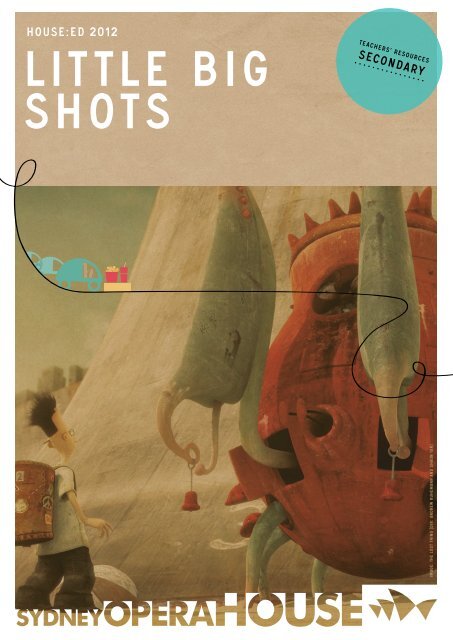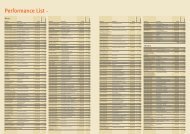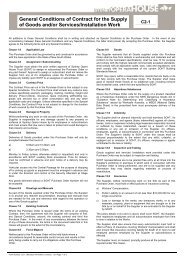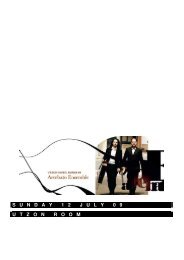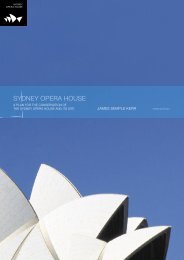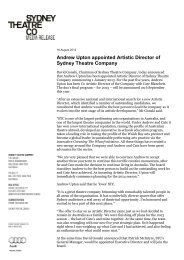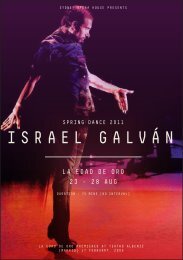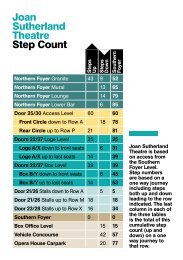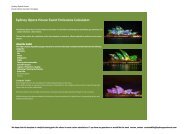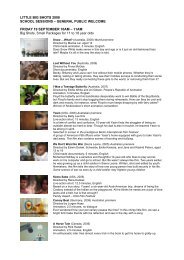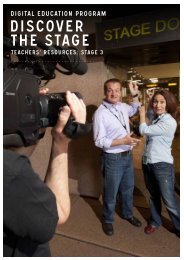Little Big Shots - Secondary Teachers - Sydney Opera House
Little Big Shots - Secondary Teachers - Sydney Opera House
Little Big Shots - Secondary Teachers - Sydney Opera House
Create successful ePaper yourself
Turn your PDF publications into a flip-book with our unique Google optimized e-Paper software.
HOUSE:ED 2012<br />
<strong>Little</strong> big<br />
shots<br />
TEACHERS’ RESOURCES<br />
SECONDARY<br />
image: THE LOST THING [DIR: ANDREW RUHEMANN AND SHAUN TAN]
Introduction<br />
These teachers’ notes have been designed to assist you with classroom preparation in relation to the<br />
<strong>Little</strong> <strong>Big</strong> <strong>Shots</strong> Film Festival. We hope that this resource will assist your students to further enjoy and<br />
enhance their performing arts experience back in the classroom. The activities are designed for<br />
students from Years 7-10 and provide opportunities for students to explore how sound and moving<br />
images in film create meaning.<br />
NSW Board of Studies Syllabi has been used as guides for the planning of these activities. You should<br />
adapt the activities to suit the student age and stage of your class and the curriculum foci and<br />
outcomes used in your school.<br />
Some websites are suggested throughout this resource. It is recommended that you first visit the sites<br />
and assess the suitability of the content for your particular school environment before setting the<br />
activities based on these.<br />
Classroom Context and Curriculum Links<br />
This performance provides the classroom teacher with many opportunities for learning activities that<br />
link to the following curriculum areas:<br />
NSW Board of Studies Curriculum<br />
OUTCOMES INDICATORS<br />
STAGE 4, ENGLISH<br />
Outcome 1: A student responds to and<br />
composes texts for understanding,<br />
interpretation, critical analysis and pleasure.<br />
Outcome 3: A student responds to and<br />
composes texts in different technologies.<br />
Outcome 6: A student draws on experience,<br />
information and ideas to imaginatively and<br />
interpretively respond to and compose texts.<br />
Outcome 9: A student demonstrates<br />
understanding that texts express views of<br />
their broadening world and their relationships<br />
within it.<br />
STAGE 5, ENGLISH<br />
Outcome 1: A student responds to and<br />
composes increasingly sophisticated and<br />
sustained texts for understanding,<br />
interpretation, critical analysis and pleasure.<br />
Outcome 3: A student selects, uses, describes<br />
and explains how different technologies affect<br />
and shape meaning.<br />
1.1 respond to imaginative, factual and critical texts, including<br />
the required range of texts, through wide and close listening,<br />
reading and viewing<br />
1.5 interpret, question and challenge information and ideas in<br />
texts through close study<br />
3.2 respond critically and imaginatively to texts in a range of<br />
technologies, including video, computers, print and<br />
handwriting.<br />
6.5 identify the ways characters, situations and concerns in<br />
texts connect to students’ own experiences, thoughts and<br />
feelings<br />
9.6 assess representations of people, places and events in film<br />
and the media<br />
1.1 respond to and compose a range of imaginative, factual and<br />
critical texts which are increasingly demanding in terms of<br />
their linguistic, structural, cognitive, emotional and moral<br />
complexity<br />
3.3 identify and critically evaluate the ways information, ideas<br />
and issues are shaped by and presented through technology
Outcome 6: A student experiments with<br />
different ways of imaginatively and<br />
interpretively transforming experience,<br />
information and ideas into texts.<br />
Outcome 9: A student demonstrates<br />
understanding of the ways texts reflect<br />
personal and public worlds.<br />
VICTORIAN ESSENTIAL LEARNING STANDARDS (VELS) <br />
VELS STRAND VELS DOMAINS<br />
Physical, personal and social learning •<br />
•<br />
Interdisciplinary learning •<br />
•<br />
•<br />
Discipline based learning •<br />
•<br />
•<br />
6.8 explain ways in which film-makers transform concepts into<br />
film, including consideration of script, story lines, sustained<br />
perspective, and visual and aural components of film-making<br />
and their interaction<br />
9.1 respond to and compose texts that reflect their expanding<br />
worlds from the personal to the public<br />
9.2 relate the content and ideas in texts to the world beyond<br />
the texts<br />
9.5 draw conclusions about their own values in relation to the<br />
values expressed and reflected by texts, and their responses to<br />
them.<br />
Interpersonal Development<br />
Personal Learning<br />
Communication<br />
Thinking Processes<br />
Information and Communications Technology (ICT)<br />
English<br />
The Arts<br />
The Humanities
Performance Description and Synopsis<br />
<strong>Little</strong> <strong>Big</strong> <strong>Shots</strong> is Australia's major annual touring children's film festival and is perfect for students of<br />
all ages. Each year the festival returns with a whole new crop of juicy screen adventures to amaze and<br />
delight. An inspiring, meaningful and fun-filled festival, <strong>Little</strong> <strong>Big</strong> <strong>Shots</strong> features the best in local and<br />
international children's shorts, animations, documentaries and child-produced films.<br />
The films screening in <strong>Little</strong> <strong>Big</strong> <strong>Shots</strong> inspire discussion of world cultures, different languages,<br />
cultural diversity, emotional intelligence and human values.<br />
THEMES: CREATIVITY, IMAGINATION, GROWING UP<br />
Package 7: The Next <strong>Big</strong> Thing<br />
FILM COUNTRY SYNOPSIS<br />
Daydream Israel<br />
Fluffy McCloud Ireland<br />
Flowers In Our<br />
Garden<br />
There ' s a<br />
Hippopotamus On<br />
Our Roof Eating Cake<br />
The Vacuum Kid USA<br />
Australia (Vic)<br />
Australia (Vic)<br />
THEMES: LOVE, DEATH, COURAGE, FAMILY<br />
Package 8: Six to Tween<br />
FILM COUNTRY SYNOPSIS<br />
Push Past: Rob Dyer ' s<br />
Skate Across America Canada<br />
A mature, lonely child, jumps from sand dunes and<br />
dreams of flying.<br />
A short film about a friendly cloud with anger<br />
management issues.<br />
A documentary where children use their own stories<br />
and drawings to communicate their experience.<br />
With Zoe getting older, outlooks diverge about her best<br />
friend's residence on their roof.<br />
Kyle Krichbaum is a 5th grade kid who stands up for<br />
what he believes in - his love for the vacuum cleaner.<br />
Crossing UK Boy meets girl in a story about perception.<br />
Mary and the Miners UK<br />
What Remains USA<br />
Broken Wings Australia<br />
Junk UK<br />
The story of 10 year old miner, Mary Watkins, in the<br />
19th Century.<br />
The last man on earth scavenges the ruins of<br />
civilization, looking for survivors.<br />
The story of two lost souls from the sky, fallen to the<br />
world below.<br />
An uplifting documentary about Rob Dyer’s epic<br />
skateboarding voyage across Canada through<br />
Skate4Cancer.<br />
A tale of an obsession with junk food that may prove<br />
hard to swallow.
Package 9: Tweenarama <br />
FILM COUNTRY SYNOPSIS<br />
Grandma Australia<br />
Pizzangrillo Italy<br />
Heaven Behind the<br />
<strong>House</strong><br />
Norway<br />
The Locket Australia (Vic)<br />
First Date Australia<br />
Out of Erasers Sweden<br />
Disco UK<br />
Sean is walking home to Grandmother's. What will he<br />
encounter along the way?<br />
At 65, Ettore is tired of life. His 10-year old nephew,<br />
Luca, is worried for him. Together they rediscover the<br />
joy of living.<br />
A little boy follows a red thread that leads to the thing<br />
he wants most in the world.<br />
Opportunity comes to those who take it. It would be<br />
easy to discard a worthless, old locket.<br />
A young man prepares for an important first date. Does<br />
he have the courage to take the final daunting step?<br />
A woman going home becomes a victim of a strange<br />
infection. She soon realises an epidemic is spreading.<br />
July 1997 England. Meanwhile Danny is trying to tell a<br />
girl named Pippa that he likes her.
LESSON TEACHING AND LEARNING ACTIVITIES RESOURCES REGISTER<br />
PRESHOW ACTIVITIES<br />
1 THE SHORT FILM<br />
This activity is an opportunity for your students to reflect on the form of the short narrative film.<br />
• Discuss the classical narrative film structure with the class. The following web link may be useful.<br />
Classical Narrative Structure: http://inpoint.cinematheque.bc.ca/pdf/LanguageofFilm02.pdf<br />
The short film is a particular type of film. Unlike the feature film, the brevity of its running time means that the film maker must<br />
plan their ideas and concept carefully to ensure what they want to achieve can be covered in the shorter screening time. Like a<br />
short story, characters and situations need to be developed and communicated quickly so that the complication can be<br />
introduced within the early minutes of the film.<br />
• View a selection of short films with your students. You may have copies of Tropfest DVDs or you can view short films<br />
online. A couple of web links are provided below. You will need to preview these short films before screening them for<br />
your students to check they are age appropriate.<br />
National Film Challenge: http://filmchallenge.org/2011-Finalists/2011-finalist-the-night-rider.html<br />
Film Shorts – The Greatest Short Films Online: http://www.filmsshort.com/festival-winners/Oscar-Winners-Short-<br />
Films-1.html<br />
• Ask your students to watch the films you have selected. As they watch the films, ask them to identify aspects of both story<br />
and plot. They can use the Short Film Analysis Worksheet to help them distinguish between story and plot.<br />
• As a class, discuss some of the features of the narrative structures of short films. Compare these features with the<br />
narrative structures of feature films.<br />
Computers with<br />
internet access<br />
Interactive<br />
Whiteboard with<br />
internet, or DVD<br />
player<br />
Short Film Analysis<br />
worksheet
2 LITTLE BIG SHOTS AND OTHER FILM FESTIVALS<br />
In this activity you and your students will learn about the <strong>Little</strong> <strong>Big</strong> <strong>Shots</strong> film festival and consider the function and purpose<br />
of film festivals as cultural events. Use the following web link as a resource for this first activity: www.littlebigshots.com.au<br />
• Ask your students to visit the web link and answer the following questions:<br />
1. What types of films are in this festival?<br />
2. Who are the films for?<br />
3. Where will <strong>Little</strong> <strong>Big</strong> <strong>Shots</strong> programs be shown?<br />
4. Look at the link to the lists of films being shown. What three films would you like to see?<br />
5. What information is given about each film?<br />
6. What are some good reasons for having film festivals for different groups and communities in our society?<br />
7. Look at the list of films in these notes. How many different countries are represented and what are their names?<br />
8. What are the benefits of viewing films from different societies and cultures?<br />
• Ask your students to research one or two film festival (see suggestions in the resources list). In their research, ask your<br />
students to use the attached Film Festival Research worksheet to help develop their enquiry.<br />
• Divide the class into pairs. Ask each pair to imagine that they are choosing films for a film festival that will be screened<br />
for students in their age group. They are only allowed to pick five films for their festival to show the class. The film<br />
festival will have a specific focus on a genre/theme/s and/or subject matter.<br />
• Ask pairs to work together in groups of four. From the combined list of ten films they now have to choose seven films to<br />
show in their festival. They must order the films in a sequence for screening and explain links between films in terms of<br />
genre, themes and subject matter. While each group is only allowed seven films in their festival, they can work together<br />
to find other films to add to their screening list to make their thematic or subject content focus more cohesive.<br />
• Each group of four is to create a title for their film festival. They can also design a poster, brochure or other promotional<br />
material for their festival.<br />
• Ask each group to share their ideas for their film festival with the class including explanations for their final film choices<br />
related to the genre, themes and/or subject matter that the festival will explore.<br />
Computers with<br />
internet access<br />
Film Festival<br />
Research worksheet
3 FILM CRITICISM<br />
• Revise film-making terminology with your students, in particular camera shots, camera angles and camera movement.<br />
The following link may help with this activity.<br />
YouTube - Camera <strong>Shots</strong> and Angles: www.youtube.com/watch?v=ZwbsYgZ7d-8<br />
YouTube – How To Tutorial – Types of Camera <strong>Shots</strong>: www.youtube.com/watch?v=gy-PdW_xaic&feature=related<br />
• Choose a short section of film from a movie that your students are familiar with. Divide the class into groups of three or<br />
four and give each group one of the following areas to analyse in the film sequence. Each group will report back to the<br />
class on how the film makers used these techniques to make the film action more engaging and/or to create meaning.<br />
- Camera <strong>Shots</strong> and Angles<br />
- Camera Movement<br />
- Music/sound effects<br />
- Acting<br />
- Lighting (and special effects if there are any)<br />
- Location<br />
- Costume<br />
• Visit the following Board of Studies NSW Assessment Resource Centre website. Here you will find some work samples<br />
from students who have completed a unit on writing a film review for publication in a teenage magazine. Select some<br />
examples for your students to read and discuss. In your discussion, identify strengths and areas for improvement.<br />
Consider the use of evaluative language, reference to film techniques, and the structure of the reviews.<br />
Board of Studies NSW – examples of Student Film Reviews:<br />
http://arc.boardofstudies.nsw.edu.au/index.cfm?objectid=44B78621-AEF6-36B7-E68F0C4B9AB598B5<br />
Computers with<br />
internet access
POSTSHOW ACTIVITIES<br />
4 WRITING A FILM REVIEW<br />
This activity is an opportunity for students to share their responses to the viewing of the films in the <strong>Little</strong> <strong>Big</strong> <strong>Shots</strong> program.<br />
Your students will complete a review of one of the films they saw. This can be completed as a class, in pairs or individually.<br />
• The following questions can be used as guidelines for a discussion or written review of the films. A Film Review<br />
Worksheet with these questions has been provided.<br />
1. What was the title of the film?<br />
2. Where was the film made?<br />
3. What was the film about? ( Identify the main conflict facing the character/s)<br />
4. If the film was representing a section of society, a cultural group or community, who were they and how well do you<br />
feel they were represented?<br />
5. Choose one character from one film that you liked the most. What were the needs of this character in the film?<br />
6. Describe one moment you remember where the film makers used camera techniques to convey the subjective view<br />
of the character.<br />
7. What were the key themes and messages in the film? Who were these messages for?<br />
8. What images were the most memorable in the film? Why?<br />
9. What other camera shots, camera movements and angles were used in the film? How did the use of these camera<br />
techniques help make the film interesting or enjoyable to watch?<br />
10. Describe the type of music/sound effects used in the film. What sort of mood and atmosphere did the music and/or<br />
sound effects create?<br />
11. What criticisms do you have of this film? How did these weaknesses impact on the overall quality of the film?<br />
• Share the reviews as a class.<br />
• You might like to submit reviews to the <strong>Little</strong> <strong>Big</strong> <strong>Shots</strong> site and read some previous reviews.<br />
<strong>Little</strong> <strong>Big</strong> <strong>Shots</strong> – Kids Page: www.littlebigshots.com.au/schools-and-families/kids<br />
Film Review<br />
Worksheet
5 YOUR OWN SHORT FILM<br />
NB. This activity will require a substantial amount of time for planning and development.<br />
• In this activity your students will write a short film script that would be about 7-8 minute in screen time. Remind your<br />
students about the principles of narrative structure and the parameters that a short film time-frame creates for the film<br />
maker.<br />
• Ask your students to complete an initial concept map for their short film STORY addressing: Who? What? Where? How?<br />
Why?<br />
(The concept can be completed as a visual presentation to communicate this information. It can be either digital or hard<br />
copy, including images, key words, clips from other films to suggest style/mise-en-scene etc.)<br />
• Decide on the orientation complication and resolution for the film, especially the climactic moment in the film.<br />
• Develop the PLOT by mapping moments of conflict or obstacles and key turning points in the journey of the character.<br />
This should be imagined visually, as moments on the screen.<br />
• Develop these ideas into a film script that describes location, action, includes any dialogue, sound effects and music.<br />
• Develop a story board from the script that includes specifics about locations, placement and movement of actors, camera<br />
shots, camera angles, camera movement.<br />
• If your class has time, ask each student to pitch their film script to the class. The class vote on the top four films they like<br />
the most. The class then works in production teams to produce, film and edit the selected short film scripts.<br />
6 EXPLORING THEMES AND ISSUES<br />
• Hold a class discussion about the themes and issues in the <strong>Little</strong> <strong>Big</strong> <strong>Shots</strong> films seen by your students. Create a class<br />
brainstorm list of the themes explored in the films. Some of these themes may tie into work your students have covered<br />
in other topics.<br />
Some common themes include:<br />
- Friendship<br />
- Belonging<br />
- Change<br />
- Love<br />
- Grief<br />
- Acceptance
• Divide the class into pairs. Each pair is to choose one film for thematic analysis. Explain how themes are often presented<br />
through the issues, challenges or problems character face in the film. The message of the film about the theme is<br />
communicated through the ways in which the character or characters deal with the issues they face.<br />
• Each pair is to report back to the class once they have completed the following:<br />
- What is the main theme explored in the film?<br />
- Provide examples from the film that show how the theme is explored (examples of theme or issue can often be found<br />
in key moments of action where the main character is confronted with obstacles, overcomes obstacles or changes in<br />
some way).<br />
- Explain the message the film gives related to the theme<br />
- Link this film to other films in the program that have similar themes<br />
TEACHER’S OVERVIEW AND UNIT EVALUATION
References and Resources<br />
Australian Film Television and Radio School<br />
www.aftrs.edu.au<br />
BBC Film Network – Why Make A Short Film?<br />
www.bbc.co.uk/filmnetwork/filmmaking/guide/introduction/why-make-a-short<br />
BBC Film Network – What Makes A Good Short?<br />
www.bbc.co.uk/filmnetwork/filmmaking/guide/introduction/what-makes-a-good-short<br />
Cannes Film Festival<br />
www.festival-cannes.fr/en/festival.html<br />
Film Shorts – The Greatest Short Films Online<br />
www.filmsshort.com/festival-winners/Oscar-Winners-Short-Films-1.html<br />
<strong>Little</strong> <strong>Big</strong> <strong>Shots</strong><br />
www.littlebigshots.com.au<br />
Melbourne International Film Festival<br />
http://miff.com.au/<br />
National Film Challenge<br />
http://filmchallenge.org/2011-Finalists/2011-finalist-the-night-rider.html<br />
<strong>Sydney</strong> Film Festival<br />
http://sff.org.au/<br />
Toronto International Film Festival<br />
http://tiff.net/<br />
Tropfest<br />
http://tropfest.com/au/<br />
Wiki How To – Making A Short Film<br />
www.wikihow.com/Make-a-Short-Film<br />
Visual Story Telling and Narrative Structure – The History of Film Study Guide<br />
www.cinematheque.bc.ca/education/pdfs/f_h_guide03.pdf<br />
<strong>Teachers</strong> Notes written by Matthew Clausen.
SHORT FILM ANALYSIS Student Worksheet<br />
STORY The information about characters, situation, tension and resolution <br />
Where is the story set? <br />
What event begins the story? <br />
Who are the main characters? <br />
What conflict(s) do they face? <br />
What happens to the characters as they face this conflict? <br />
Who wins and who loses in the conflict? <br />
_______________________________________________________________________________________________________________________<br />
_______________________________________________________________________________________________________________________<br />
_______________________________________________________________________________________________________________________<br />
_______________________________________________________________________________________________________________________<br />
_______________________________________________________________________________________________________________________<br />
_______________________________________________________________________________________________________________________<br />
_______________________________________________________________________________________________________________________<br />
_______________________________________________________________________________________________________________________<br />
_______________________________________________________________________________________________________________________<br />
_______________________________________________________________________________________________________________________<br />
_______________________________________________________________________________________________________________________<br />
_______________________________________________________________________________________________________________________<br />
_______________________________________________________________________________________________________________________<br />
_______________________________________________________________________________________________________________________<br />
_______________________________________________________________________________________________________________________<br />
_______________________________________________________________________________________________________________________<br />
_______________________________________________________________________________________________________________________<br />
_______________________________________________________________________________________________________________________<br />
_______________________________________________________________________________________________________________________<br />
_______________________________________________________________________________________________________________________<br />
_______________________________________________________________________________________________________________________<br />
_______________________________________________________________________________________________________________________<br />
_______________________________________________________________________________________________________________________
SHORT FILM ANALYSIS Student Worksheet cont’d<br />
PLOT What happens during the film <br />
How is the major conflict established? <br />
How are the main characters introduced? <br />
What cause and effect events happen to lead the characters to face the conflict? <br />
How is the tension of the film heightened as it draws to its close (what happens to characters?)? <br />
How does the film resolve most of the major conflicts set up at the outset? <br />
_______________________________________________________________________________________________________________________<br />
_______________________________________________________________________________________________________________________<br />
_______________________________________________________________________________________________________________________<br />
_______________________________________________________________________________________________________________________<br />
_______________________________________________________________________________________________________________________<br />
_______________________________________________________________________________________________________________________<br />
_______________________________________________________________________________________________________________________<br />
_______________________________________________________________________________________________________________________<br />
_______________________________________________________________________________________________________________________<br />
_______________________________________________________________________________________________________________________<br />
_______________________________________________________________________________________________________________________<br />
_______________________________________________________________________________________________________________________<br />
_______________________________________________________________________________________________________________________<br />
_______________________________________________________________________________________________________________________<br />
_______________________________________________________________________________________________________________________<br />
_______________________________________________________________________________________________________________________<br />
_______________________________________________________________________________________________________________________<br />
_______________________________________________________________________________________________________________________<br />
_______________________________________________________________________________________________________________________<br />
_______________________________________________________________________________________________________________________<br />
_______________________________________________________________________________________________________________________<br />
_______________________________________________________________________________________________________________________<br />
_______________________________________________________________________________________________________________________<br />
Adapted from: Visual Story Telling and Narrative Structure Accessed: 3/6/2012<br />
www.cinematheque.bc.ca/education/pdfs/f_h_guide03.pdf
FILM FESTIVAL RESEARCH Student Worksheet<br />
Complete the following research questions on a Film Festival of your choice.<br />
Name of Festival: ___________________________________________________________________________________________________<br />
Years of <strong>Opera</strong>tion: _________________________________________________________________________________________________<br />
Information about funding and sponsors:<br />
_______________________________________________________________________________________________________________________<br />
_______________________________________________________________________________________________________________________<br />
_______________________________________________________________________________________________________________________<br />
Types of films screened:<br />
_______________________________________________________________________________________________________________________<br />
_______________________________________________________________________________________________________________________<br />
_______________________________________________________________________________________________________________________<br />
What purpose does this festival provide for the film industry?<br />
_______________________________________________________________________________________________________________________<br />
_______________________________________________________________________________________________________________________<br />
_______________________________________________________________________________________________________________________<br />
What types of film makers will benefit from this festival?<br />
_______________________________________________________________________________________________________________________<br />
_______________________________________________________________________________________________________________________<br />
_______________________________________________________________________________________________________________________<br />
In terms of cultural representation, which cultural groups are included in the most recent festival?<br />
_______________________________________________________________________________________________________________________<br />
_______________________________________________________________________________________________________________________<br />
_______________________________________________________________________________________________________________________<br />
Are there any groups who are not represented or types of films you think are not included?<br />
_______________________________________________________________________________________________________________________<br />
_______________________________________________________________________________________________________________________<br />
_______________________________________________________________________________________________________________________
FILM REVIEW Student Worksheet<br />
LITTLE BIG SHOTS<br />
FILM REVIEW QUESTIONS<br />
1. What was the title of the film? _______________________________________________________________________________<br />
2. Where was the film made? ___________________________________________________________________________________<br />
3. What was the film about? ( Identify the main conflict facing the character/s)<br />
__________________________________________________________________________________________________________________<br />
__________________________________________________________________________________________________________________<br />
__________________________________________________________________________________________________________________<br />
__________________________________________________________________________________________________________________<br />
4. If the film was representing a section of society, a cultural group or community, who were they and<br />
how well do you feel they were represented?<br />
__________________________________________________________________________________________________________________<br />
__________________________________________________________________________________________________________________<br />
__________________________________________________________________________________________________________________<br />
__________________________________________________________________________________________________________________<br />
5. Choose one character from one film that you liked the most. What were the needs of this character<br />
in the film?<br />
__________________________________________________________________________________________________________________<br />
__________________________________________________________________________________________________________________<br />
__________________________________________________________________________________________________________________<br />
__________________________________________________________________________________________________________________<br />
6. Describe one moment you remember where the film makers used camera techniques to convey the<br />
subjective view of the character.<br />
__________________________________________________________________________________________________________________<br />
__________________________________________________________________________________________________________________<br />
__________________________________________________________________________________________________________________<br />
__________________________________________________________________________________________________________________
FILM REVIEW Student Worksheet cont’d<br />
7. What were the key themes and messages in the film? Who were these messages for? <br />
__________________________________________________________________________________________________________________<br />
__________________________________________________________________________________________________________________<br />
__________________________________________________________________________________________________________________<br />
__________________________________________________________________________________________________________________<br />
8. What images were the most memorable in the film? Why?<br />
__________________________________________________________________________________________________________________<br />
__________________________________________________________________________________________________________________<br />
__________________________________________________________________________________________________________________<br />
__________________________________________________________________________________________________________________<br />
9. What other camera shots, camera movements and angles were used in the film? How did the use of<br />
these camera techniques help make the film interesting or enjoyable to watch?<br />
__________________________________________________________________________________________________________________<br />
__________________________________________________________________________________________________________________<br />
__________________________________________________________________________________________________________________<br />
__________________________________________________________________________________________________________________<br />
10. Describe the type of music/sound effects used in the film. What sort of mood and atmosphere did<br />
the music and/or sound effects create?<br />
__________________________________________________________________________________________________________________<br />
__________________________________________________________________________________________________________________<br />
__________________________________________________________________________________________________________________<br />
__________________________________________________________________________________________________________________<br />
11. What criticisms do you have of this film? How did these weaknesses impact on the overall quality of<br />
the film?<br />
__________________________________________________________________________________________________________________<br />
__________________________________________________________________________________________________________________<br />
__________________________________________________________________________________________________________________<br />
__________________________________________________________________________________________________________________


